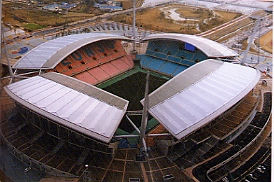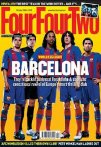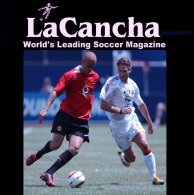 |
| Posters | Videos | CD-ROMS | Games | Soccer Mags | Books | Products! |
 |
| JEONJU |
| The Gourmet Capital of
Korea |
Located in the south-western part of Korea, Jeonju is the capital of Jeollabuk-do province and home to more than 600,000 people. The city is 240 km south of Seoul.
Jeonju can trace its history back to 757 AD, when the ancient city of Wansan was renamed Jeonju. The settlement itself dates back to the first century B.C.
Jeonju has long been known a centre of culture and carries on many cultural traditions including the Jeonju Daesasubnori - a traditional music festival - and the special exhibitions and games held on Dano, the fifth day of the fifth lunar month. Also in Jeonju is the Gangnam Calligraphic Art Gallery, which houses some 1,600 works by many of Korea's masters of calligraphy, both past and present.
Jeonju was also the home of two of Korea's most famous Christian martyrs, Jong-Chul Yoo and his wife Yinugalda. The couple, who swore a vow of chastity on their wedding night were martyred in the late 1790s when the Christian faith was under attack in Korea. A stone cross on mount Songnam celebrates their dedication to their beliefs.
The Catholic influence is very strong in Jeonju. One of the most beautiful churches in Korea can be found here, a blend of Byzantine and Romanesque architecture which was built in 1891 facing the Inspection Office where Jong-Chul Yoo was martyred.
The area also has strong Confucian and Buddhist traditions, with a Confucian school dating back before the 14th Century.
However, Jeonju is perhaps best known for its food and, in particular, for its bibimbap. Bibimbap is a traditional Korean dish made of boiled rice mixed with meat, seasonal vegetables and the ubiquitous chilli sauce. Traditional Jeonju bibimbap is served with as many as 30 different ingredients and side dishes.
Another local favourite is gongnamul gukbap, a dish made with rice and bean-sprouts and seasoned with dark soy paste, leeks and kimchi. Washed down with glass of moju, the local liquor, this trademark Jeonju dish is a perfect way to end the day.
Information
Web site: www.worldcupjeonju.com (Korean, English)
Tel: 82-63-281-2553-4
Fax: 82-63-281-2662
| JEONJU WORLD CUP STADIUM |
 |
| Simple and refined, the Daejon Stadium was designed to welcome spectators with the warmth found in the traditional courtyards of Korean homes. |
| Key Facts Name: Daejeon World Cup Stadium Type: Football Only Opened: September 13 2001 Cost: W121.7 billion Total Capacity: 41,024 Spectator seats: Under cover: 33,897 Open: 7,113 VIP seats: 584 VIP Boxes: 20 ( 234 seats) Disabled seats: 274 |
| Pitch Size: 116m x 79m Spectator Parking: 1,753 Distances to Stadium From city centre: 7 km From Cheongju Airport: 45 km From railway station: 9 km From bus terminal: 10 km Press Facilities Press seats: 597 Seats with desk and telephone: 597 Space for commentators: 597 Space for photographers: 98 |
Source: FIFA
 |
 |
 |
 |
 |
 |
| Videos | New Posters | CALENDARS | Books | Magazines |
| VISIT THE WORLD'S LEADING SOCCER MAGAZINE |
| Posters | Videos | Books | Games | Mags | New Products |
| MAIN LINKS** CLUBS (Intl.) COUNTRIES PLAYERS WOMEN YOUTH COLLEGE HIGH SCHOOL SOCCERMALL |
 |
|